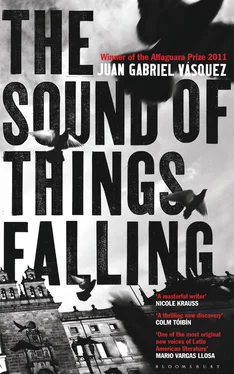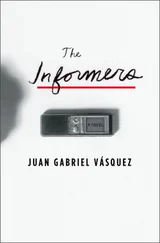I didn’t arrive in the area until past midday. After a traffic jam of almost an hour and a half near Guarinocito (a truck with a broken axle can be lethal on a two-lane highway with no hard shoulder), after the headlands arose on the horizon and my car entered the region of cattle ranches, I saw the rudimentary little school I was supposed to see, continued for the distance indicated beside a big white pipe bordering the road and turned right, towards the Magdalena River. I passed a metallic structure where once there had been a billboard, but that now, seen from far away, resembled a sort of giant abandoned corset (a few turkey vultures, perched on the struts, guarded the plot of land); I passed a trough where two cows were drinking, their bodies very close together, pushing and getting in each other’s way, their heads protected from the sun by a squalid aluminium roof. At the end of 300 metres of unpaved road, I found myself passing several groups of boys in shorts who shouted and laughed and raised a great cloud of dust as they ran. One of them stuck out a small brown hand with his thumb extended. I stopped, pulled the car onto the shoulder; now still, I felt again on my face and body the violent slap of the midday heat. I felt the humidity again; I sensed the smells. The child spoke first.
‘I’m going where you’re going, sir.’
‘I’m going to Las Acacias,’ I said. ‘If you know where it is, I’ll take you that far.’
‘Oh well, that’s no good to me then, sir,’ the boy said without his smile disappearing for a second. ‘It’s just down there, you see. That dog’s from there. He doesn’t bite, don’t worry.’
It was a black, tired-looking German shepherd with a white mark on his tail. He noticed my presence, raised his ears and looked at me without interest; then he walked a couple of times around a mango tree, his nose to the ground and tail stuck to his ribs like a feather duster, and finally lay down beside the trunk and began licking a paw. I felt sorry for him: his fur was not designed for this climate. I drove a bit further, beneath the trees whose dense foliage didn’t let any light through, until I arrived in front of a gate of solid columns and a wooden crossbeam from which hung a board that looked recently rubbed with furniture oil, and on the board appeared, etched and singed, the graceless and bland name of the property. I had to get out to open the gate, the original bolt of which seemed to have been stuck in its place since the beginning of time; I continued on quite a way along a track across an open field made simply by driving across it, two strips of earth separated by a crest of stiff grass; and finally, beyond a post where a small vulture perched, I arrived in front of a one-storey white house.
I called out but nobody appeared. The door was open: a glass-topped dining table and a living room with light-coloured armchairs, all dominated by ceiling fans whose blades seemed animated by a sort of inner life of their own, a private mission against high temperatures. On the terrace hung three brightly coloured hammocks, and under one of them someone had left a half-eaten guava that was now being devoured by ants. I was about to ask at the top of my lungs if there was anybody at home when I heard a whistle, and then another, and it took me a couple of seconds to discover, beyond the bougainvillea bushes that flanked the house, beyond the guanábana trees that grew behind the bougainvilleas, the silhouette moving its arms as if asking for help. There was something monstrous in that overly white figure with too big a head and legs too thick; but I couldn’t look closely as I walked towards her, because all my attention was concentrated on not breaking my ankle on the stones or uneven ground, on not getting my face scratched by the low branches of the trees. Behind the house sparkled the rectangle of a swimming pool that didn’t look well cared for: a blue slide with the paint bleached by the sun, a round table with its parasol folded down, the skimmer net leaning against a tree as if it had never been used. That’s what I was thinking when I arrived beside the white monster, but by that time the head had turned into a veiled mask, and the hand into a glove with thick fingers. The woman took off the mask, passed a hand quickly through her hair (light brown, cut with intentional clumsiness, styled with genuine carelessness), greeted me without smiling and explained that she’d had to interrupt the inspection of her hives to come and receive me. Now she had to get back to work. ‘It’s stupid for you to have to go get bored in the house waiting for me,’ she said, pronouncing every letter, almost one at a time, as if her life depended on it. ‘Have you ever seen a honeycomb up close?’
I immediately realized she was about the same age as me, more or less, although I couldn’t say what secret generational communication there was between the two of us, or if such a thing really exists: an ensemble of gestures or words or a certain tone of voice, a way of saying hello or thanks or of moving or crossing our legs when we sit down, that we share with other members of our litter. She had the palest green eyes I’d ever seen and on her face a girl’s skin met a mature and careworn woman’s expression: her face was like a party that everyone had left. There were no adornments, except for two sparks of diamonds (I think they were diamonds) barely visible on her slender earlobes. Dressed in her beekeeper’s suit that hid her shape, Maya Fritts took me to a shed that might once have been a manger: a room that smelled of manure with two masks and a pair of white overalls hanging on the wall.
‘Put these on,’ she ordered me. ‘My bees don’t like bright colours.’
I wouldn’t have called the blue of my shirt a bright blue, but I didn’t argue. ‘I didn’t know bees saw in colour,’ I said, but she was already putting a white hat on my head and explaining how to secure the nylon veil of the mask. As she passed the cords under my armpits to tie them behind my back, she hugged me like a passenger on a motorbike; I liked the proximity of her body (I thought I felt the phantom pressure of her breasts against my back) but also the sureness with which her hands acted, the firmness or lack of embarrassment as they touched my body. From somewhere she took out another pair of white shoelaces, went down on one knee, used them to tie closed the bottom of the trouser legs and said, looking me in the eye without the least embarrassment, ‘So they don’t go stinging you in sensitive places.’ Then she grabbed a kind of metal bottle with golden bellows and asked me to carry it, and she stuck a red brush and a steel crowbar in her pockets.
I asked her how long she’d had this hobby.
‘It’s not a hobby,’ she told me. ‘I make my living from this, my dear. The best honey in the region, if I do say so myself.’
‘Well, congratulations. And how long have you been producing the best honey in the region?’
She explained on the way to the hives. She explained other things too. And so I learned how she had come to set up home on this property, which was her only inheritance. ‘My parents bought the land when I was born, more or less,’ she said. So, I commented, this was all that was left of them. ‘There was money left too,’ said Maya, ‘but I spent it on lawyers.’ ‘Lawyers are expensive,’ I said. ‘No,’ she said, ‘they’re like dogs: they smell fear and attack. I was very inexpert when it all started. I should say that someone less honest could have taken everything.’ As soon as she came of age and could take charge of her own life, she started planning a way of leaving Bogotá, and she hadn’t turned twenty when she did so definitively, dropping out of university and falling out with her mother over it. When the final inheritance settlement came down, Maya had already been settled here for a good decade. ‘And I’ve never regretted having left Bogotá,’ she told me. ‘I couldn’t take it any more. I detest that city. I’ve never been back. I wouldn’t know what it’s like now, maybe you can tell me. You live in Bogotá?’
Читать дальше












